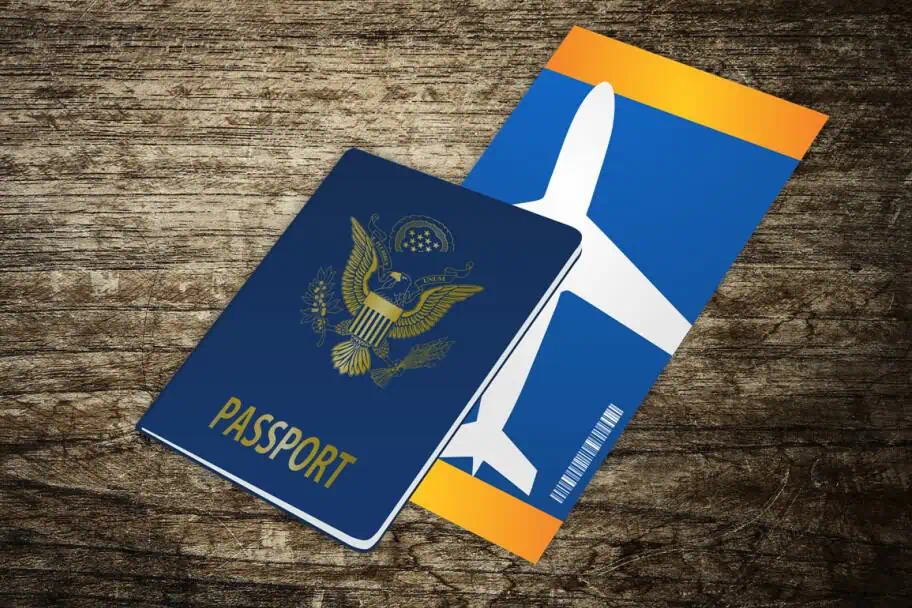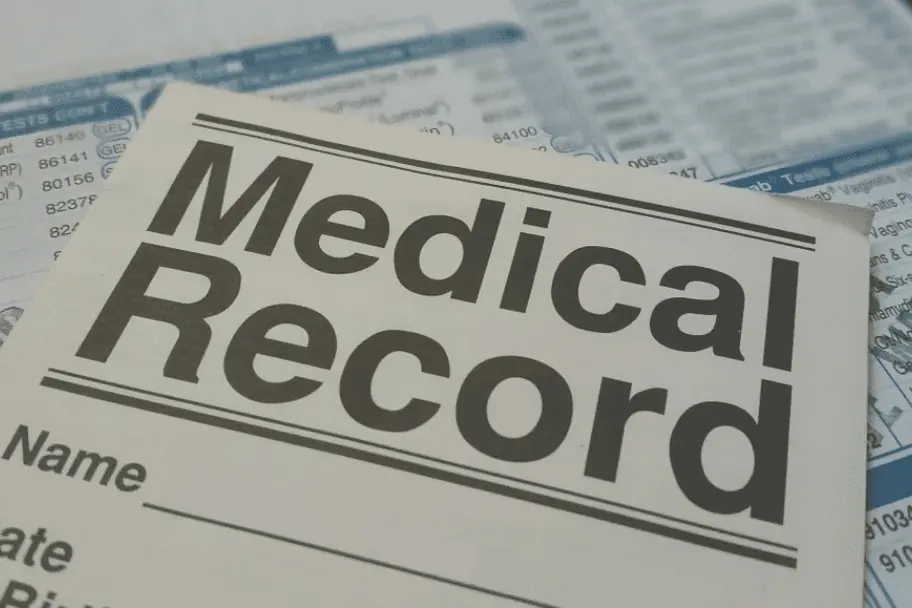For many travelers, the breathtaking country of Argentina is a dream destination. With vibrant cities, spectacular national parklands, and an amazing food scene, the country has something for everyone. Whether you are visiting to explore the gorgeous Patagonia region in the South, see the jaw-dropping magnitude of the Iguazu Falls in the North, or spend time in one of the country’s amazing cities, you won’t be disappointed. However, before you can hop on a plan and start your Argentinian adventure, you need to make sure you meet the Argentina entrance requirements.

To ensure you meet the entrance requirements for Argentina, I have provided an outline of all the entrance requirements in this article. Furthermore, I also created a handy checklist that I linked to below that you can use to track the requirements as you meet them.
Download the Argentina Entrance Requirements Checklist
Argentina Passport Requirements

One of the most important Argentinian entrance requirements you must consider when planning your trip is the country’s passport requirements. To be allowed into Argentina, your passport must be valid on your arrival date. If your passport is set to expire before you arrive in Argentina, you will need to renew your passport before your trip.
| Passport Validity | Blank Passport Pages |
|---|---|
| Must be valid on the date of entry. | One Page Required for Entry Stamp. |
Argentina VISA Requirements

Depending on your nationality, you may not need to obtain a VISA before visiting Argentina. If you are a passport holder from a VISA-exempt country, you are allowed to enter Argentina without a VISA as long as you don’t overstay your VISA exemption period. Passport holders from countries that are not VISA exempt will need to apply for a tourist VISA before traveling to Argentina.
| VISA-Exempt Passport Holders | Non VISA-Exempt Passport Holders |
|---|---|
| Not required to obtain a VISA before travel. | Obtain a Tourist VISA before arrival. |
If you are a passport holder from the following countries, you are not currently required to obtain a VISA before visiting Argentina as long as you stay in the country for less than the specified number of days.
| Andorra * | Guyana * | Panama * | |||
| Armenia * | Honduras * | Paraguay * | |||
| Australia * | Hong Kong (R.A.E.H.K.) * | Peru * | |||
| Austria * | Hong Kong (B.N.O.) *** | Poland * | |||
| Barbados * | Hungary * | Portugal * | |||
| Belarus * | Ireland * | Romania * | |||
| Belgium * | Iceland * | Russia * | |||
| Bolivia * | Israel * | Saint Kitts & Nevis * | |||
| Brazil * | Italy * | San Marino * | |||
| Bulgaria * | Jamaica *** | Saint Lucia * | |||
| Canada * | Japan * | St Vincent & Grenadines * | |||
| Colombia * | Kazakhstan *** | Serbia * | |||
| Costa Rica * | South Korea * | Singapore * | |||
| Croatia * | Latvia * | Slovakia * | |||
| Czech Republic * | Liechtenstein * | Slovenia * | |||
| Chile * | Lithuania * | South Africa * | |||
| Cyprus * | Luxembourg * | Spain * | |||
| Denmark * | Macedonia * | Sweden * | |||
| Ecuador * | Malaysia *** | Switzerland * | |||
| El Salvador * | Malta * | Thailand * | |||
| Estonia * | Mexico * | Trinidad & Tobago * | |||
| Vatican City * | Monaco * | Turkey * | |||
| Finland * | Mongolia * | Ukraine * | |||
| France * | Montenegro * | United Arab Emirates * | |||
| Georgia * | Nicaragua * | United Kingdom * | |||
| Germany * | Norway * | United States * | |||
| Greece * | New Zealand * | Uruguay * | |||
| Grenada *** | Netherlands * | Venezuela ** | |||
| Guatemala * |
| * – Visa Exempt for up to 90-days |
| ** – Visa Exempt for up to 60-days |
| *** – Visa Exempt for up to 30-days |
Argentina Immunization Requirements

Important Note: I am not a medical doctor and do not have any medical experience. The information provided in this section is a summary of information that I got from the recommendations of the Centers for Disease Control and Prevention in the United States for travel to Argentina. I am providing you this information to help bring awareness of the necessary vaccinations to you, but consultation with my guide should not replace a discussion about your travels with your doctor or a travel medical clinic.
One of the most important, and yet most often overlooked, aspects of travel is the necessary vaccinations that are required or recommended to keep you safe and healthy when you travel. Before you depart for Argentina, you are going to want to make sure that you have all of the proper vaccinations.
Some of these vaccinations, like the Yellow Fever vaccination, are included in the Argentinian entrance requirements. Other vaccinations, such as a flu shot and the Rabies vaccine, are recommended, but not required. For your convenience, I have summarized the CDC’s recommendations on vaccines and healthcare for travelers visiting Argentina for you to review below.
Recommended Travel Vaccinations for Argentina
There are several vaccinations that the CDC recommends that you get before traveling to Argentina, which I have outlined for you below. Please be aware that yellow fever is endemic to regions within Argentina, so you will need to get a Yellow Fever vaccination if you are visiting one of these regions. Please pay special attention to the details in this section of the guide and make sure you discuss all vaccinations with your doctor or travel health clinic.
| Vaccine | How Disease Spreads | Details |
|---|---|---|
| Hepatitis A | Food and Water | Recommended for most travelers. |
| Hepatitis B | Blood and Body Fluids | Accelerated schedule available. |
| Measles | Contact with Infected Individuals | Cases of measles are on the rise worldwide. Travelers are at risk of measles if they have not been fully vaccinated at least two weeks prior to departure, or have not had measles in the past, and travel internationally to areas where measles is spreading. |
| Rabies | The saliva of infected animals. Bites or licks on open wounds are the most common vector. | Pre-exposure vaccination requires two shots over 7 days. The benefit of getting pre-exposure vaccination is that it makes getting a Rabies Immunoglobulin shot if exposed while traveling unecessary. For more information, check out the guide on Rabies vaccination I linked below and speak to your doctor. |
| Typhoid | From food and water you handle or ingest. | Recommended for most travelers, especially those staying with friends or relatives or visiting smaller cities or rural areas. |
| Yellow Fever | Mosquito Bite | Recommended for travelers ≥9 months old going to Corrientes and Misiones Provinces. Generally not recommended for travel to Formosa Province or to designated areas of Chaco, Jujuy, and Salta Provinces. Not recommended for travel limited to provinces and areas not listed above. For more information, refer to the CDC Travelers’ Health website. |
Routine Vaccinations for Argentina
In addition, the vaccinations that are recommended for travel to Argentina specifically, there are other routine vaccinations you should be current on before traveling anywhere in this world. For an overview of the routine vaccinations recommended by the CDC, please review the chart that I have included below.
| Disease Name | How Disease Spreads | Advice |
|---|---|---|
| Measles Mumps Rubella (MMR) | Various Vectors | Given to anyone unvaccinated and/or born after 1957. One time adult booster recommended |
| TDAP (Tetanus, Diphtheria & Pertussis) | Thru open wounds & airborne transmission | Only one adult booster of pertussis required |
| Chickenpox | Direct contact with infected individuals & airborne transmission | Given to those unvaccinated that did not have chickenpox |
| Shingles | Direct contact with infected individuals | Vaccine can still be given if you have had shingles. |
| Pneumonia | Airborne transmission | Two vaccines given separately. All 65+ or immunocompromised should receive both |
| Influenza | airborne transmission | Vaccine components change annually |
| Meningitis | Direct contact with infected individuals & airborne transmission | Given to anyone unvaccinated or at an increased risk, especially students |
| Polio | Thru contaminated food and water | Considered a routine vaccination for most travel itineraries. Single adult booster recommended |
Non-Vaccine Preventable Diseases
In addition to the recommended vaccinations, there are other health precautions to take when visiting Argentina to avoid getting sick. While these health precautions aren’t on the list of the Brazilian entrance requirements, they are important measures that you can take to make sure you don’t get ill while traveling.
AVOID CONTAMINATED WATER
When traveling, one of the easiest ways to get sick is to come into contact with contaminated water. There is an illness that is found in Brazil that can be spread by either drinking or swimming in contaminated water. Before you depart for your trip, you will want to be aware of the illness below. To avoid getting sick, make sure you stick to drinking bottled water and avoid swimming in stagnant pools.
| Disease Name | How Disease Spreads | Advice |
|---|---|---|
| Leptospirosis | Touching fluids of infected animal or drinking or swimming in contaminated water. | Avoid contaminated water and soil. |
AVOID BUG BITES
Another easy way to get sick while traveling is to be bitten by bugs that carry illnesses. The most common insect that spreads diseases to humans is the mosquito, but ticks and flies can also spread serious illnesses through their bites.
To make sure you don’t fall ill from an insect bite while in Argentina, I would recommend bringing insect repellent and mosquito netting with you when you visit and avoid getting bitten by bugs as much as possible.
Believe it or not, Buenos Aires is one of the areas in Argentina with the highest incidents of Dengue. So, making sure you protect yourself from mosquitos while in Argentina is very important.
| Disease Name | How Disease Spreads | Advice |
|---|---|---|
| Chagas disease (American Trypanosomiasis) | Accidentally rub feces (poop) of the triatomine bug into the bug bite, other breaks in the skin, your eyes, or mouth. | Avoid Bug Bites |
| Dengue | Mosquito bite. | Avoid Bug Bites |
| Leishmaniasis | Sand fly bite. | Avoid Bug Bites |
| Zika | Mosquito bite or pregnant woman spreading to her unborn baby. | Avoid Bug Bites |
BE AWARE OF AIRBORNE AND DROPLET ILLNESSES
Out of all the ways that illnesses can be spread, airborne diseases are the hardest to protect yourself against. After all, you don’t have to physically touch or be touched by an infected person or animal and there isn’t a repellant that you can spray on to avoid catching these illnesses.
This is why it is always important to be observant of those with whom you interact while traveling. This is the best way to make sure you don’t expose yourself to potentially harmful airborne illnesses. According to the CDC, the particular airborne illnesses that you should be aware of while traveling to Argentina are as follows:
| Disease Name | How Disease Spreads | Advice |
|---|---|---|
| Hantavirus | Coming into contact with bodily fluids or droppings of infected rodents, being biten by an infected rodent, or less commonly from coming into contact with someone else who is infected. | Avoid rodents and people who look sick. |
| Tuberculosis (TB) | Breathing in the air from an infected individual (via cough, speaking, etc..) | Avoid people who look sick. |
Argentina Customs Restrictions

Another important aspect of travel to Argentina that you need to be aware of before you travel is the country’s customs regulations. Like other countries, there are certain goods that you are restricted or even prohibited from bringing into the country. To ensure that you don’t make the costly mistake of having one of these restricted items in your baggage, I have outlined the Argentinian custom requirements for you to review below.
FREE IMPORT
According to the VISAHQ.com, website, the following items are considered free-import items when entering Argentina, but with limits (as described below).
- 2 liters of alcoholic beverages.
- 400 cigarettes or 50 cigars.
- 5kg of food.
The following free important limits are for travelers from Bolivia, Brazil, Chile, Paraguay, Uruguay, or Argentinian residents returning after more than a year away.
- 1 liter of alcoholic beverages.
- 200 cigarettes or 25 cigars.
- 2kg of food.
PROHIBITED ITEMS
Before you will be allowed into Argentina, you will also need to clear customs to be sure you aren’t carrying any prohibited items with you. For instance, travelers are strictly prohibited from bringing the following items into Argentina:
- Illegal drugs.
- Weapons and\or ammunition (without permission).
- Explosives.
- Knives or deadly weapons.
- Meat or meat products of any kind.
- Milk and dairy products.
- Fresh fruit and vegetables.
- Trees, plants, or plant products.
- New Computers or TVs.
- Soil.
- Counterfeit money and goods.
- Pornographic material.
CONTROLLED ITEMS
In addition to these prohibited items, the government of Argentina has placed limits on the quantity of other items that can be brought into the country. If you plan to travel with any of the following items when visiting Argentina, you will want to plan accordingly so that you do not violate the Argentinian entrance requirements:
- Firearms and ammunition require permission from the Registro Nacional de Armas (RENAR) (National Firearms Bureau).
- Bringing in dogs or cats requires an official veterinary health and vaccination certificate (animals under 3 months do not require a rabies vaccination certification).
- Mobile phones being imported require permission from the customs department.
Argentina Currency Information

The final aspect of the Argentinian entrance requirements that you will want to understand before traveling is the currency considerations. Not only will you need to understand the currency limits, but you also need to understand how to obtain, convert, and use currency while in Argentina. The country has faced serious hyperinflation in recent years, so understanding the currency issues before you travel is critically important.
Currency Restrictions
The first thing you must understand about Argentina’s currency regulations is how much money you are allowed to bring in and out of the country. According to the US State Department website, the government of Argentina has the following currency limits and regulations in place:
- Up to USD 10,000 or equivalent may be brought into the country without a declaration for travelers over the age of 16. The limit is USD 5,000 or equivalent for travelers under the age of 16.
- Up to USD 10,000 or equivalent may be taken out of the country without a declaration for travelers over the age of 16. The limit is USD 5,000 or equivalent for travelers under the age of 16.
Currency Issues in Argentina
In case you weren’t aware, Argentina has had some economic issues recently. While the United States has been dealing with up to 9% inflation in recent years, the inflation rate in Argentina has recently reached nearly 200%. This has caused significant currency issues that have had a lasting impact on the country’s economic situation.
For instance, the 1000-peso note in Argentina is currently worth just USD 1.50. So, if you want to carry cash in Argentina, you will be carrying large wads of bills around with you. Now, things have started to improve under Javier Milei’s leadership. Hopefully, things will continue to get better. Until then, you should understand how to navigate the currency situation in Argentina before you visit.
THE TWO CURRENCY MARKETS
Because of the high inflation rates, Argentines prefer to hold onto US Dollars, which is seen as a more stable currency. This has created an environment where there are two distinct markets for exchanging money in Argentina. You have both the official market, where the government sets the exchange rate, and the blue market (mercado azul), where supply and demand set the rate.
Since Milei introduced his plan to start dollarizing the Argentinian economy in 2023, the difference in exchange rates between the official market and the blue market has tightened. Before he began making changes, it was not uncommon for the exchange rate in the blue market to be almost twice as much as the official market.
CASH VS CREDIT CARDS
Because of the high inflation rate, I would suggest using a credit card as much as possible while traveling in Argentina. While credit card companies use the official exchange rate, this isn’t as big of an issue now that the difference in rates has tightened. When the blue rate was twice as much as the official rate, using credit cards made a lot less sense than it does now. Credit cards are now a much more attractive way to pay for things in Argentina.
Credit cards are accepted in most places, including hotels, restaurants, and stores. However, you should always ask and not assume they are accepted. In some cases, there may be a minimum purchase amount that needs to be reached before credit cards are accepted. In most cases, VISA and Mastercards are widely accepted in Argentina, with American Express less so. I suggest carrying a few different cards with you so that you have a backup.
CONVERTING CURRENCY
If you do need to convert currency while in Argentina, here are a few different options that you have:
- Cuevas – Unofficial currency exchanges that use the blue rate. They are generally safe and Argentines use them daily. You can ask the concierge at your hotel for recommendations.
- Arbolitos on Calle Florida – If you are visiting Buenos Aires, there are many Arbolitos (currency exchangers) that will exchange money for you at the blue rate. Look for someone yelling, “Cambio! Cambio!”.
- Currency Exchange Houses and Banks – If you are nervous about using informal markets to exchange money, you can always use formal currency exchange houses and banks. You won’t get as good of an exchange rate, but the difference isn’t nearly as big between the official rate and the blue rate nowadays.
Don’t Forget to Subscribe to My Adventures!

Let Me Help You Save On Your Next Adventure!
‘Start Exploring Today’ Merchandise Available Now!














Leave a Reply